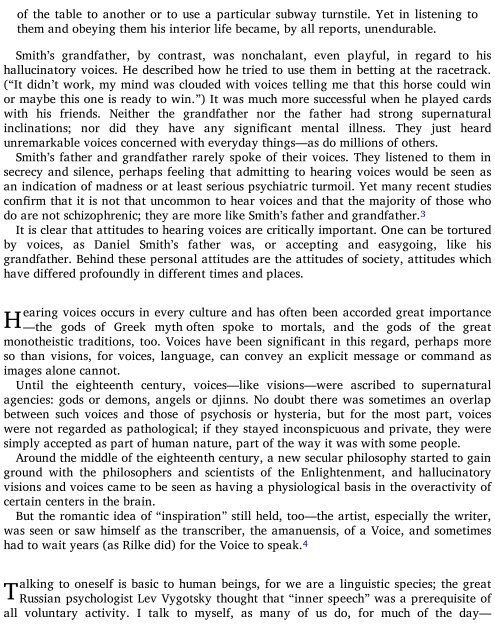32896589326509350
You also want an ePaper? Increase the reach of your titles
YUMPU automatically turns print PDFs into web optimized ePapers that Google loves.
of the table to another or to use a particular subway turnstile. Yet in listening to<br />
them and obeying them his interior life became, by all reports, unendurable.<br />
Smith’s grandfather, by contrast, was nonchalant, even playful, in regard to his<br />
hallucinatory voices. He described how he tried to use them in betting at the racetrack.<br />
(“It didn’t work, my mind was clouded with voices telling me that this horse could win<br />
or maybe this one is ready to win.”) It was much more successful when he played cards<br />
with his friends. Neither the grandfather nor the father had strong supernatural<br />
inclinations; nor did they have any signicant mental illness. They just heard<br />
unremarkable voices concerned with everyday things—as do millions of others.<br />
Smith’s father and grandfather rarely spoke of their voices. They listened to them in<br />
secrecy and silence, perhaps feeling that admitting to hearing voices would be seen as<br />
an indication of madness or at least serious psychiatric turmoil. Yet many recent studies<br />
conrm that it is not that uncommon to hear voices and that the majority of those who<br />
do are not schizophrenic; they are more like Smith’s father and grandfather. 3<br />
It is clear that attitudes to hearing voices are critically important. One can be tortured<br />
by voices, as Daniel Smith’s father was, or accepting and easygoing, like his<br />
grandfather. Behind these personal attitudes are the attitudes of society, attitudes which<br />
have differed profoundly in different times and places.<br />
H<br />
earing voices occurs in every culture and has often been accorded great importance<br />
—the gods of Greek myth often spoke to mortals, and the gods of the great<br />
monotheistic traditions, too. Voices have been signicant in this regard, perhaps more<br />
so than visions, for voices, language, can convey an explicit message or command as<br />
images alone cannot.<br />
Until the eighteenth century, voices—like visions—were ascribed to supernatural<br />
agencies: gods or demons, angels or djinns. No doubt there was sometimes an overlap<br />
between such voices and those of psychosis or hysteria, but for the most part, voices<br />
were not regarded as pathological; if they stayed inconspicuous and private, they were<br />
simply accepted as part of human nature, part of the way it was with some people.<br />
Around the middle of the eighteenth century, a new secular philosophy started to gain<br />
ground with the philosophers and scientists of the Enlightenment, and hallucinatory<br />
visions and voices came to be seen as having a physiological basis in the overactivity of<br />
certain centers in the brain.<br />
But the romantic idea of “inspiration” still held, too—the artist, especially the writer,<br />
was seen or saw himself as the transcriber, the amanuensis, of a Voice, and sometimes<br />
had to wait years (as Rilke did) for the Voice to speak. 4<br />
T<br />
alking to oneself is basic to human beings, for we are a linguistic species; the great<br />
Russian psychologist Lev Vygotsky thought that “inner speech” was a prerequisite of<br />
all voluntary activity. I talk to myself, as many of us do, for much of the day—

















